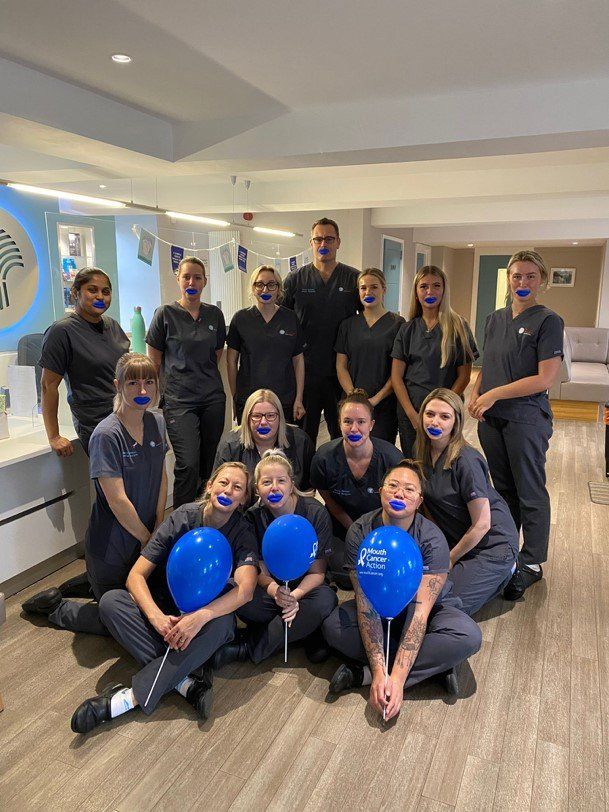This year the practice has supported mouth cancer awareness by participating in the 10km walk from home. Team members have united to walk around the Vale of Belvoir helping to raise funds for this cause. Donations are still being accepted through the following link https://www.justgiving.com/fundraising/maltings-dental-practice
The charity is encouraging as many people as possible to step out and make a difference during Mouth Cancer Action Month.
Jason Wong, Mouth Cancer Awareness committed clinical ambassador, also joined the 10km in Hyde Park that was held in September.
The practice also showed their support by participating in ‘Blue Wednesday’. Blue lips and accessories were worn by the team to raise awareness and images were shared on social media.
What is mouth cancer?
Mouth cancer is where a tumour develops on the surface of the tongue, mouth, lips or gums. The tumours can appear like a lump, an ulcer or red and white patches lining the surface of the lips/tongue/cheeks. Non-healing ulcers should also be treated suspiciously as these can also be a form of mouth cancer.
Who is at risk?
Heavy smoking and alcohol consumption are the major risk factors for the development of mouth cancers. Chewable tobaccos used in cultures can also cause this. Recent links to HPV (human papilloma virus) and oral cancer have also been shown to be a significant contributory factor.
People with diets lacking fresh fruit and vegetables are also putting themselves at an increased risk.
How common is mouth cancer?
78% off cases occur in the Over 55 age group. Incidence has risen by 49% over the past 10 years.
Mouth Cancer is TWICE as common in men than women, though an increasing number of women are being diagnosed with the disease.
5 year SURVIVAL rate has hardly improved in last few decades due to late detection.
How can I reduce my risk of getting mouth cancer?
1. Maintain a well-balanced diet high in fresh fruit, vegetables, olive oil and fish.
2. Do not smoke.
3. Do not exceed the recommended alcohol consumption guidelines.
4. Visit your dentist regularly. As most forms of mouth cancer are often painless and symptom-free, your dentist plays a vital role in examining your oral soft tissues and look out for the warning signs and can refer you to the local specialist department if they are concerned about any areas.
Remember, the earlier the detection, the less the spread, and the better the outcome of treatment.
If you have any concerns, you should ask your dentist.
It is really important for all patients to continue to attend their dental check-ups, including patients who have a full set of false teeth so that we can continue to check for mouth cancers. Mouth and throat cancers can grow and spread quickly. If anyone has any concerns then just call our reception team, we are more than happy to take a look, you aren’t “wasting our time” or “being silly”. We are here to reassure you and if needed help onto the right pathway if any further treatment is needed.
If in doubt get checked out, be mouth aware.
This month our practice is offering Free Mouth Cancer Checks to casual non regular patients. To take advantage, please call the practice to book in during November.


The Maltings Dental Practice, Commercial Rd, Grantham, Lincs. NG31 6DE
| The Maltings Dental Practice



